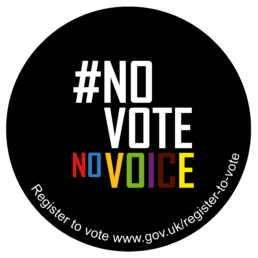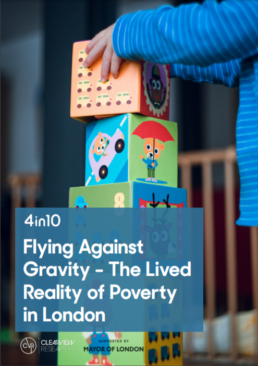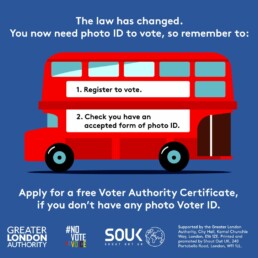4in10 Newsletter 29.6.23
Read the latest newsletter here.
To get this directly to your inbox every fortnight please do join us.
Voter ID and Shout Out UK

A few months ago there was a change in how elections are run in this country, when the Elections Act 2022 came into force
The Act bought in a wide range of changes that will have an impact in London including removing second preference voting in Mayoral contests, but arguably the biggest change was the introduction of compulsory voter ID.
This was trialled in the local elections in May this year to mixed success. The Electoral Commission’s full report is not due out till September but their initial findings have been so troubling that they have released an interim report. This can be found here. The biggest takeaway for me from this was that 14,000 people were not able to vote as a direct result of these changes.
The most significant reason for this does seems to have been lack of awareness of the new rules – only 84% of people knew about the new requirements according to the interim report. I would here quote a family member who when reminded of the need to bring ID said ‘well I never have to in the past’.
Another issue which is of particular concern for us in 4in10 however is unequal access to the right forms of ID. The House of Commons Library produced a report in which they said:
‘The proportion of respondents to the Electoral Commission’s Public Opinion Tracker 2022 who did not have a suitable form of ID for voting was higher among more disadvantaged groups. 14% of unemployed people, 10-17% of those living in rented local authority or housing association accommodation and 7% of people with lower levels of education did not have a suitable form of ID.’
Indeed the interim report found that two of the groups were awareness was lowest was among younger age groups (18 to 24-year-olds) and Black and minority ethnic communities which were both at 82%.
Valid forms of ID
The other issue that continues to be of concern is the types of valid ID. The list of ID that is accepted can be found here.
If you have a look at this list, one thing that becomes immediately clear is that the majority, if not all, of the options available cost money to obtain – a passport for example costs a minimum of £90 once you take into account the cost of the photo.
Some would then counter with the fact that in theory you can obtain a ‘free’ form of ID from your council but even this isn’t completely free as you are expected to bring a passport style photograph with you.
For some families that are already having to choose between heating and eating, paying for a photo to be produced and then spending time finding and filling in a complicated form simply can’t be a priority.
This can be shown in that awareness and take-up of the Voter Authority Certificate (a free voter ID document you can apply for) was low with only 89,500 certificates being issued around the whole Country according to the Electoral Commission’s interim report.
The London Context
London already has one of the lowest voter registration rates in the UK and these changes has the potential to make this situation considerably worse.
There are many reasons for this but one of the biggest is the high proportion of ethnic minority communities in London. Voter registration tends to be lower in ethnic minority communities. This is the case for many reasons, including in particular insecure, short term housing but no matter what the cause the result remains the same.
We at 4in10 are concerned that unless more is done to raise awareness of the new rules and to make it easier and cheaper to obtain the necessary ID, then Londoners who are already at most at risk of being disenfranchised will be denied the right to vote.
That is why over the last few months we have been supporting Shout Out UK who have been leading the public awareness campaign on this issue and we will continue to do so.
We are asking our membership to help us and Shout Out UK by spreading the word about it and where possible help people to get the ID that they need. Find out how here.
4in10 Newsletter 15.6.23
Read the latest newsletter here.
To get this directly to your inbox every fortnight please do join us.
Child Poverty in London: a societal problem calls for community-led solutions (Part 3)

Our Research and Learning Officer, Emily, discusses three questions on the issue of child poverty in London. This piece is split across three blog posts:
- What is child poverty?
- What’s the state of child poverty in London?
- How do we end child poverty?
How do we end child poverty?
This is a big task. Let’s say tomorrow the government printed money and gave it to every family under the relative poverty line and promised to keep sending them money to ensure they never fall below that line, would child poverty end? If that question were posed to different politicians and members of the public, I’m sure several revealing answers would emerge. The reality is that things are much more complicated than just money. But as a start, money really does help. The £20 per week uplift to Universal Credit that was temporarily put in place during the pandemic pulled 400,000 children out of poverty. Other estimates claim that making this permanent would lift 500,000 children out of poverty. So money must be part of our child poverty strategy. So too would other public systems. Having an adequately sustained NHS and mental health services would keep children and their parents well, which cuts costs, both in terms of health itself and the knock-on effects of poor health.
Flexible working could also be seen as a support structure to allow adults, particularly women, to work consistently and progress in their careers while also caring for their children. And there’s also the housing issue. In London housing is incredibly expensive and too many affordable options are unsuitable. Guaranteeing affordable homes for everyone can be seen as part of a child poverty strategy.
So it’s about money, but it’s also about a community-based strategy. We need to eradicate the shame. There is no reason to judge people. Ending shame is not ending personal responsibility. Ending child poverty requires us to work together. It means believing the evidence that shows the causes of inequality and poverty are multiple and intersecting. It also means, perhaps, as a community taking on the shame that we don’t yet know how to support each other well enough. Privilege and discrimination has blinded many of us to our own personal responsibility. We can do better at that, but we need to be honest about our role and how we can learn to support each other more holistically and with respect.
4in10, London’s Child Poverty Network is committed to supporting collaborative working. We are a network of organisations who want to see an end to child poverty in London. There is so much brilliance bottled up in the children of this city. When we invest in them and make sure each of them has an opportunity to thrive, then we will begin to see transformations that we will all benefit from.
London’s Child Poverty Alliance, the policy sub-group of London’s Child Poverty Network has identified four key areas that can be catalysts for change. In our Manifesto, we outline current areas of inequality and systemic failure that are points of potential transformation that could ultimately bring an end to child poverty in London. Secure, adequate income will give families the resource to access what they need. All across London, our homes are fundamental to our health and wellbeing. When our homes are of decent quality, the comfort and security they provide enrich our lives and support our mental and physical health. Every child deserves the best start in life, ending child poverty means ensuring every child has access to the early education and childcare to thrive. Lastly, having access to nutritious and reliable food sources so that all children are free from hunger can target one of the essential threats of child poverty. Together, we can make child poverty a way things used to be rather than how we live now if we target these four areas as crucial pinch points of poverty to make London a fairer city for every child.
Child Poverty in London: a societal problem calls for community-led solutions (Part 2)

Our Research and Learning Officer, Emily, discusses three questions on the issue of child poverty in London. This piece is split across three blog posts:
- What is child poverty?
- What’s the state of child poverty in London?
- How do we end child poverty?
What’s the state of child poverty in London?
Unfortunately, the number of children in poverty across London is extremely high. The latest figures from 2021/22 show that London has a child poverty rate of 32.9% according to End Child Poverty Coalition. We expect this to increase when the current year’s figures are released. Experiencing poverty can mean children are only able to afford cheap, unhealthy food. It might mean they skip washing their clothes, bathing and brushing their teeth. It can result in anxiety and isolation, aggressive or regressive behaviour. Being trapped in poverty can lead to a stressful environment at home, where children feel like they need to take on adult responsibilities to help out. While all these things can be true for any child of any household income, the likelihood of overlapping challenges or examples of ‘going without’ can be much greater when a child is in poverty. Parents can be doing the best they can with what they’ve got, but they can’t absorb all of the trauma that impacts them and their families.
How do we respond to child poverty?
The government prioritises helping families get into work. This can be one valuable, effective way to help families in poverty. However, it’s important that context is considered. For one, balancing children’s needs with a work schedule is very difficult. So, for single-parent families flexible, adequate work is crucial. In addition, some parents can’t work because either they or their child is disabled and therefore more support is needed that looks different than paid work. Also, illness needs to be considered as some adults can’t work because they are dealing with an acute illness. Therefore, as a society, we have to think about helping families get support and money in their pockets and community connections that look beyond the paid work route out of poverty.
At 4in10, we talk about supporting organisations who work to end poverty or mitigate its impact. To end child poverty would be to ensure that families have the income they need to cover the essentials. This can look like a robust social security which puts money back into the pockets of families, it can also look like higher pay which increases the incoming funds on a regular basis and it can also take the form of organisational tax breaks or social investment in services so that more support is freely available which reduces the need to ‘buy in’ to participate in local communal activities and opportunities.
In terms of mitigation of the effects of child poverty, again, some specific considerations help draw out this point. Children know when they don’t have as much as others. Children are experts in observation, they learn from seeing and doing and so they know when things are different. When it comes to household finances, they may not know the details or understand the specific issues, but children are capable of knowing when they have less or shouldn’t ask for more. As part of communities all across London, we can help nurture belonging and fairness by making it easy to share resources, reduce additional expenses at school and offer out-of–school activities that are free of charge and sustainably developed and delivered. By making it less about what you can buy and more about where we can belong, the organisations such as youth clubs, art groups, theatres, community organisations, schools and many other community-led programmes help children access support and meaningful relationships with those local to them. This can create a buffer between children and the impact of poverty on their wellbeing. These kinds of services will always be important, even if child poverty disappeared from London. Their existence helps offer important outreach to children and their families. It’s important that these organisations can focus on what they do best, but the current system demands them to follow the money in terms of endless cycles of grant submissions, reporting and project adaptation to keep the budgets balanced. This makes losers out of all of us. Funding can and should be sustainable.
There are steps that all of us can take in our organisations and as individuals to help advocate and implement change. In our Manifesto for a child poverty free London, we outline four key areas that would help reduce child poverty across London. Income, housing, childcare and hunger. These four areas impact us all and in different ways, individuals, businesses, local, regional and national government can help contribute to make the situation better for children. This is not about attributing blame on any one group, but about community-centred and multi-faceted responses to helping improve the lives of children and challenging inequalities when and where we see them.
4in10 Newsletter 1.6.23
Read the latest newsletter here.
To get this directly to your inbox every fortnight please do join us.
4in10 Newsletter 17.5.23
Read the latest newsletter here.
To get this directly to your inbox every fortnight please do join us.
4in10 Member Conducts Research on Low-Income Families and SEND Support

Over the past several months, 4in10 has been working with one of our members, Education and Skills Development Group (ESDEG) to support them in creating an excellent report that outlines the importance of their work with low-income ethnic minority families with children who are eligible for SEND support. With a financial contribution from 4in10, Suchismita Majumdar, ESDEG’s Communications & Policy Officer conducted comprehensive interviews and analysis with the ESDEG team to get a sense of the particular needs and challenges children who require SEND support face when they and their parents seek access to additional support.
The report takes an impressive introspective look at the programmes ESDEG offers and the support they give to children and their parents in response to the particular needs of specific ethnic groups, in particular, Somali, Pakistani, Afghan, Indian and Black Caribbean communities.
Their report, available here, shines a light on the situation both for non-white families across London who encounter barriers because of cultural and economic stigma as well as the more widespread scarcity of SEND programmes and professionals in the state school system across London.
The report also includes some key evaluations that ESDEG has identified to help guide them as they plan and implement future programmes, policies and campaigns going forward.
4in10 Newsletter 4.5.23
Read the latest ewsletter here.
To get this directly to your inbox every fortnight please do join us.
How Poverty Feels

In 2021, 4in10 in partnership with the Greater London Authority commissioned ClearView Research to speak with Londoners to understand what poverty felt like since the Covid-19 pandemic had hit. What Londoners said helps paint a picture of the challenges that so many people face.
All of us across the city have ambitions and there is plenty of opportunity to go around, but it’s been ring-fenced for a small group of people leaving many with too little left. The report showed that with an inadequate social security system, many families found the challenge of gaining secure employment, suitable housing, affordable childcare and everyday costs out of reach. Despite having big dreams, many felt that they were fighting forces beyond their control, an experience compared to flying against gravity.
In 2023, with numerous strikes occurring on a regular basis, it’s clear that workers in many sectors feel they are at breaking point highlighting that the foundations are in need of repair. Basic transportation, health and teaching services are woefully underfunded and lacking investment for innovation and expansion. It’s worth revisiting this report to understand what families are facing today.
Families can’t strike, they have to keep up the fight despite recent data showing that low-income Londoners have faced 21% inflation over the last three years. Families are choosing between heating and eating and the prospect of focusing on career progression when your flat is mouldy and transportation is unaffordable and childcare is inaccessible is an impossible challenge.
What Londoners asked for in the report was for government to make the basics affordable. If childcare, cost of living bills and transportation were affordable then the possibility of families accessing better employment and housing that would enable them to thrive could come to fruition. This is what a good social security system does, it ensures we all have what we need through a social investment for us all. We need policies shaped by all of us to ensure no one gets shut out of decisions that affect them.
Revisiting this report from 2021 is worthwhile because its key findings still hold their weight. That is that poverty is something most of us are concerned about and 85% of us believe that politicians should do more about it.
With local elections just around the corner and London mayoral elections and a General Election on the horizon, it’s worthwhile thinking about making sure politicians hear from you that ending poverty warrants strategic policies. It must be a priority if communities are to thrive, and industries continue to expand providing income sources for Londoners. Flying Against Gravity shows the experiences of Londoners in first-hand accounts that remind us of the emotional toll that is unacceptable.
Together we can do more by demanding lasting change to ensure we all have what we need to soar.
4in10 Newsletter 20.4.23
Read the latest ewsletter here.
To get this directly to your inbox every fortnight please do join us.


